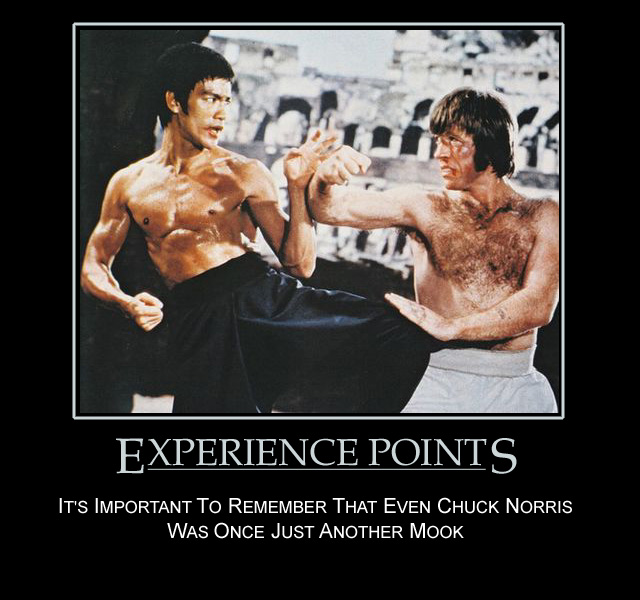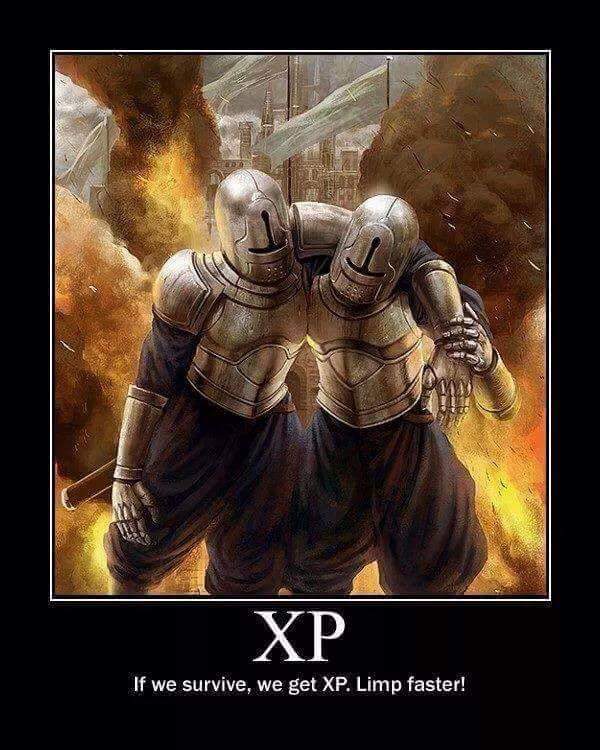
Yeah, that’s right – I didn’t save experience points for X! What am I gonna do when I get there? Who the hell knows! But I like a challenge.
Experience points (XP) are another one of those mechanics that have been around since the first tabletop RPG. In short, XP are a meta-currency that represents a character’s growth in ability, skill, and… well, experience. Traditionally, XP are used in concert with a leveling system. Once you received a certain number of XP (as determined by the rules), your character levels up and their abilities improve. Characters may also be entitled to more skill points, special abilities, or spells, depending on the game.
 In the traditional dungeon crawl game, XP is awarded mainly through the accumulation for treasure on a one-for-one basis. Despite this traditional model of XP, modern game design has produced a variety of different methods for awarding experience points. Later editions of D&D got rid of XP for treasure and instead focused almost entirely on defeating monsters. Some games offered XP for exploring new locations or making new discoveries within the setting. Others award XP for good roleplaying There are even some games that do away with task-based XP entirely, and award XP at set intervals, such as at the conclusion of an adventure.
In the traditional dungeon crawl game, XP is awarded mainly through the accumulation for treasure on a one-for-one basis. Despite this traditional model of XP, modern game design has produced a variety of different methods for awarding experience points. Later editions of D&D got rid of XP for treasure and instead focused almost entirely on defeating monsters. Some games offered XP for exploring new locations or making new discoveries within the setting. Others award XP for good roleplaying There are even some games that do away with task-based XP entirely, and award XP at set intervals, such as at the conclusion of an adventure.
The most important thing to know about XP from a game design perspective is that it’s a mechanic that incentivizes the characters towards certain actions and goals. This can have massive repercussions for the focus and feel of a game. For example, a game that awards XP solely for gaining treasure innately encourages and rewards players who seek treasure before all else. This could be a positive or a negative, depending on the sort of gaming experience you’re going for. On the one hand, putting the focus on gaining treasure means that players aren’t necessarily rewarded for every kill they make – PCs can just as easily earn XP by sneaking around and obtaining treasure through cunning and guile rather than bloodshed. On the other hand, if you want a game focused on hack n’ slash, it makes much more sense on awarding XP for kills.
 Likewise, games that award XP for discovery are going to encourage PCs to travel around and spend more time exploring the setting. They may not want to stick around long after they’ve finished searching through a location. Games that award XP for roleplaying will give players an incentive to really explore their characters’ personalities and motivations, perhaps at the expense of progress towards other goals. Finally, games that give XP at the conclusion of adventure may encourage the players to focus on reaching the goal of an adventure as quickly as possible, while ignoring other facets of the game.
Likewise, games that award XP for discovery are going to encourage PCs to travel around and spend more time exploring the setting. They may not want to stick around long after they’ve finished searching through a location. Games that award XP for roleplaying will give players an incentive to really explore their characters’ personalities and motivations, perhaps at the expense of progress towards other goals. Finally, games that give XP at the conclusion of adventure may encourage the players to focus on reaching the goal of an adventure as quickly as possible, while ignoring other facets of the game.
Granted, XP isn’t the end-all, be-all for player motivation. Some players are naturally interested in exploring, combat, or roleplaying regardless of whether or not the mechanics incentivize them to do so. But changing the method of receiving XP can go a long way for any GM looking for a way to encourage a particular type of gaming experience.
What do you think about XP? How do you normally award it? Are there any methods I haven’t mentioned that you think merit some attention? Let me know in the comments!
Do you have thoughts or questions about the article or suggestions for future content? Leave a comment below or drop me a line at jtdimino@d20radio.com.
